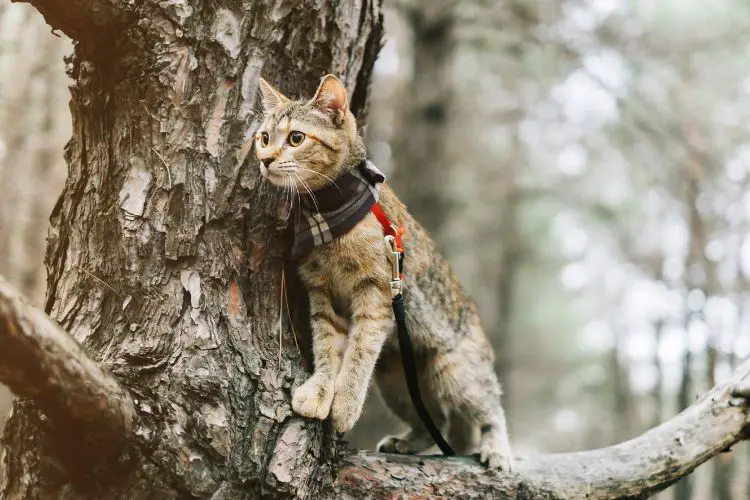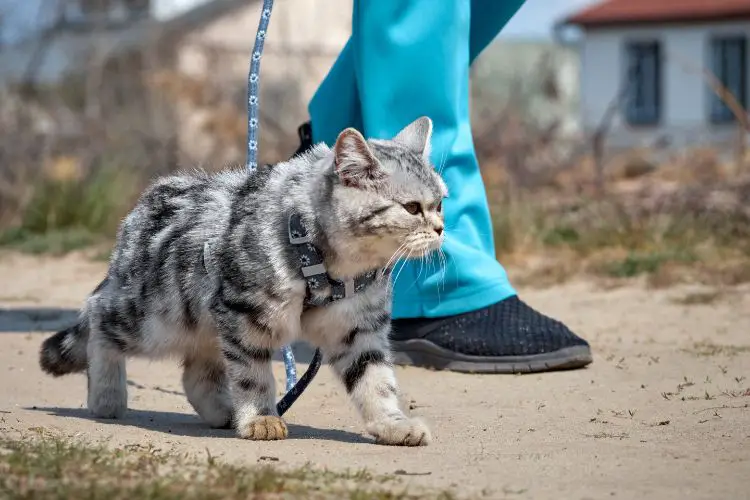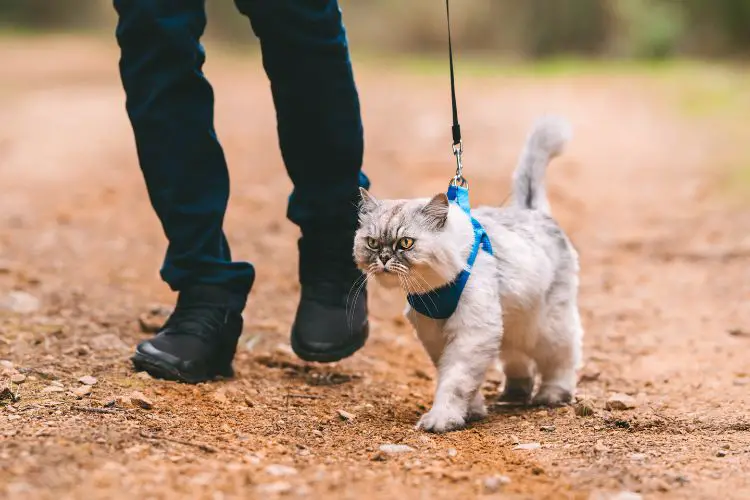The prospect of hiking with your feline friend might sound unconventional, but it’s a trend that’s gaining popularity among adventurous cat owners.
Picture yourself on a tranquil hiking trail, with your cat by your side, exploring the wonders of nature together.
While hiking with cats can be an incredibly rewarding experience, it’s crucial to plan meticulously to ensure safety, enjoyment, and memorable moments for both you and your furry companion.
In this comprehensive guide, we’ll navigate the world of hiking with cats, covering everything from understanding your cat’s personality to selecting the right equipment and handling safety concerns.
Contents
Hiking with your cat offers unique joys and challenges. In this exploration, we’ll delve into the benefits and considerations of taking your feline friend on your outdoor adventures.
Benefits of Hiking with Your Cat

- Bonding: Hiking with your cat can strengthen the emotional connection between you and your feline companion. It provides an opportunity for shared experiences and quality time together, enhancing your relationship.
- Exercise: Cats often need more physical activity than they get indoors. Hiking allows them to stretch their muscles, climb rocks or trees, and burn off excess energy. This reduces the risk of obesity and improves overall health.
- Exploration: Cats are naturally curious creatures, and hiking offers a wealth of new sights, sounds, and scents for them to explore. It can stimulate their senses and engage their innate hunting instincts.
- Fresh Air and Nature: Being outdoors exposes your cat to fresh air and natural surroundings, which can have a positive impact on their mental and physical well-being. It can reduce stress and boredom that indoor cats may experience.
Challenges of Hiking with Your Cat

- Safety: Safety is paramount when hiking with your cat. There are potential risks from encounters with wildlife, other animals, or even terrain hazards. You must be vigilant and ensure your cat is protected.
- Training: Most cats aren’t naturally inclined to walk on a leash or harness. Training can be challenging and time-consuming. Some cats may never fully adjust to the concept of walking on a leash.
- Gear: Hiking with your cat requires specific gear like a well-fitted harness, leash, and perhaps a cat backpack or carrier for resting. Investing in the right equipment is essential for your cat’s safety and comfort.
- Location: Not all hiking trails are suitable for cats. You need to choose cat-friendly trails with minimal dangers and an environment that allows for proper waste disposal.
- Stamina: Cats have limited stamina compared to dogs. You should keep hikes relatively short and provide breaks for rest and hydration. Overexertion can be harmful to your cat’s health.
Ultimate Guide to Hiking with Your Cat
Hiking with your cat can be a rewarding experience, but it requires careful planning to ensure safety for both you and your feline friend.
This guide will offer valuable insights on how to navigate the trails while prioritizing your cat’s well-being.
1. Know Your Cat’s Character
Before embarking on a hiking adventure with your feline friend, it’s essential to understand your cat’s unique personality.
Just like people, cats have distinct temperaments that can range from bold and curious to reserved and cautious.

This initial step in planning your hike involves gaining insight into your cat’s disposition, which will help you determine if they are likely to enjoy the adventure outdoors.
2. Leash Training
Proper leash training is a critical aspect of ensuring a successful hike with your cat.
Cats aren’t naturally inclined to walk on a leash, so it’s crucial to introduce them to it gradually.

Start indoors with a cat-specific harness that provides comfort and security.
During this process, it’s important to reward your cat with treats and praise to create positive associations with the harness and leash.
3. Health Prep
Before hitting the trails, schedule a visit to your veterinarian. Ensure that your cat is up-to-date on vaccinations and protected against fleas and ticks.

Your vet can also provide guidance tailored to your cat’s health and specific needs.
Don’t forget to carry copies of your cat’s medical records and assemble a comprehensive pet first-aid kit for added safety.
4. Packing Cat Essentials
Thoughtful packing is essential to ensure your cat’s comfort and well-being during the hike.
This includes estimating your cat’s daily food and water needs and bringing extra supplies. Collapsible bowls are convenient for on-the-go meals.

Additionally, don’t forget to pack any necessary medications and familiar items like a favorite toy or blanket to provide comfort and a sense of home.
5. Ensuring Trail Safety
Selecting the Perfect Trail
Picking the right hiking trail is a crucial consideration.
Opt for quieter and less crowded trails to minimize stress for your cat.
Additionally, start with easy trails and gradually progress to more challenging ones as your cat becomes more accustomed to the outdoor experience.

Environmental Responsibility
Don’t forget to show respect and safeguard the natural environment by adhering to Leave No Trace principles.
This ensures you minimize your impact on the surroundings and the local wildlife and ecosystems.
Make sure your cat doesn’t disturb the natural balance of the ecosystem during your hike.
Pro Tips for a Purrfect Hike
Constant Supervision
Continuous supervision is essential for your cat’s safety during the hike.

Keep your cat within your line of sight, as they can become disoriented in unfamiliar surroundings.
Be vigilant for potential hazards on the trail, including steep drops and wildlife encounters.
Leash Management
Proper leash management is crucial. Utilize a leash and harness designed specifically for cats to ensure comfort and security.
Find the right balance between allowing your cat some freedom to explore while maintaining enough control to protect them from potential dangers.
Recognizing Signs of Discomfort
Learn to read your cat’s signals.

Familiarize yourself with your cat’s body language to identify signs of distress or discomfort.
In hot weather, pay close attention to signs of overheating, such as excessive panting or agitation.
Do Cats Like Hiking?
Cats’ preferences for hiking can vary widely depending on their individual personalities.
Some cats with adventurous and outgoing temperaments may enjoy the experience of hiking with their owners, while others may feel more comfortable and content staying indoors.
It’s essential to consider your cat’s comfort, safety, and physical condition before introducing them to hiking, and to gradually acclimate them to the outdoor environment if you choose to give it a try.
Ultimately, whether a cat likes hiking or not depends on the cat’s unique personality and the care taken to ensure a positive experience.
How Long can a Cat Hike?

The duration of a cat’s hike can vary widely, influenced by factors like age, fitness level, temperament, and environmental conditions.
It’s advisable to start with shorter hikes of 15 to 30 minutes and monitor your cat’s behavior and comfort. Over time, you can gradually extend the hike duration if your cat seems to enjoy it.
However, always prioritize your cat’s well-being, and if they show signs of fatigue or distress, it’s essential to shorten the hike or head back home to ensure their safety and happiness during outdoor adventures.
Conclusion
Venturing into the wild with your cat can be a profoundly enriching experience filled with adventure and cherished memories.
By understanding your cat’s personality, meticulous preparation, and adherence to safety guidelines, you can transform this dream into a reality.
Each cat is one-of-a-kind, so customize your approach to accommodate your cat’s distinctive needs and preferences.
Armed with this comprehensive guide, you’re well-prepared for a remarkable and unforgettable journey with your beloved feline companion.

